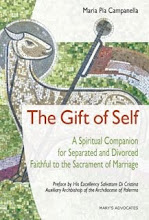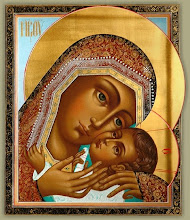Sunday, April 26, 2009
At the root of these negative phenomena there frequently lies a corruption of the idea and the experience of freedom, conceived not as a capacity for realizing the truth of God's plan for marriage and the family, but as an autonomous power of self-affirmation, often against others, for one's own selfish well-being.
This shows that history is not simply a fixed progression towards what is better, but rather an event of freedom, and even a struggle between freedoms that are in mutual conflict, that is, according to the well-known expression of St. Augustine, a conflict between two loves: the love of God to the point of disregarding self, and the love of self to the point of disregarding God.
In a deservedly famous page, Tertullian has well expressed the greatness of this conjugal life in Christ and its beauty: "How can I ever express the happiness of the marriage that is joined together by the Church strengthened by an offering, sealed by a blessing, announced by angels and ratified by the Father? ...How wonderful the bond between two believers with a single hope, a single desire, a single observance, a single service! They are both brethren and both fellow-servants; there is no separation between them in spirit or flesh; in fact they are truly two in one flesh and where the flesh is one, one is the spirit."
By virtue of the sacramentality of their marriage, spouses are bound to one another in the most profoundly indissoluble manner. Their belonging to each other is the real representation, by means of the sacramental sign, of the very relationship of Christ with the Church.
Spouses are therefore the permanent reminder to the Church of what happened on the Cross; they are for one another and for the children witnesses to the salvation in which the sacrament makes them sharers. Of this salvation event marriage, like every sacrament, is a memorial, actuation and prophecy: "As a memorial, the sacrament gives them the grace and duty of commemorating the great works of God and of bearing witness to them before their children. As actuation, it gives them the grace and duty of putting into practice in the present, towards each other and their children, the demands of a love which forgives and redeems. As prophecy, it gives them the grace and duty of living and bearing witness to the hope of the future encounter with Christ.
Accordingly, the family must go back to the "beginning" of God's creative act, if it is to attain self-knowledge and self-realization in accordance with the inner truth not only of what it is but also of what it does in history. And since in God's plan it has been established as an "intimate community of life and love,"(44) the family has the mission to become more and more what it is, that is to say, a community of life and love, in an effort that will find fulfillment, as will everything created and redeemed, in the Kingdom of God. Looking at it in such a way as to reach its very roots, we must say that the essence and role of the family are in the final analysis specified by love. Hence the family has the mission to guard, reveal and communicate love, and this is a living reflection of and a real sharing in God's love for humanity and the love of Christ the Lord for the Church His bride.
The family, which is founded and given life by love, is a community of persons: of husband and wife, of parents and children, of relatives. Its first task is to live with fidelity the reality of communion in a constant effort to develop an authentic community of persons.
As the Second Vatican Council writes: "Firmly established by the Lord, the unity of marriage will radiate from the equal personal dignity of husband and wife, a dignity acknowledged by mutual and total love."
Conjugal communion is characterized not only by its unity but also by its indissolubility: "As a mutual gift of two persons, this intimate union, as well as the good of children, imposes total fidelity on the spouses and argues for an unbreakable oneness between them."
Being rooted in the personal and total self-giving of the couple, and being required by the good of the children, the indissolubility of marriage finds its ultimate truth in the plan that God has manifested in His revelation: He wills and He communicates the indissolubility of marriage as a fruit, a sign and a requirement of the absolutely faithful love that God has for man and that the Lord Jesus has for the Church.
The gift of the sacrament is at the same time a vocation and commandment for the Christian spouses, that they may remain faithful to each other forever, beyond every trial and difficulty, in generous obedience to the holy will of the Lord: "What therefore God has joined together, let not man put asunder."
Various reasons can unfortunately lead to the often irreparable breakdown of valid marriages. These include mutual lack of understanding and the inability to enter into interpersonal relationships. Obviously, separation must be considered as a last resort, after all other reasonable attempts at reconciliation have proved vain.
Pastors must know that, for the sake of truth, they are obliged to exercise careful discernment of situations. There is in fact a difference between those who have sincerely tried to save their first marriage and have been unjustly abandoned, and those who through their own grave fault have destroyed a canonically valid marriage.
Thursday, April 9, 2009
I am in the midst of some of the legal goings on involved with divorce. I've learned more about the process than I ever cared to know. I never believed in it, and I still don't. I want to write about some of the unfairness of divorce so maybe if you are someone thinking about inflicting this kind of pain and suffering on your family you might understand. I try in my head to make sense of certain things and I just can't. A family consists of at least 2 persons, being a husband and wife, and then quite often there are kids. How is it that one person has the right to make such a decision so as to strip away the rights of the other spouse and the children to live as a family? How do they have the right to force their spouse and children into a situation where they will only be able to see each other, and spend time with each other a couple days a week? There should be accountability, but with no fault/unilateral divorce there isn't. It should be that the spouse who makes a decision to divorce and leave the family should by that very choice lose the right to be a full time parent and bestow that onto the other spouse who made no such choice. That spouse should have to live with the consequences of that decision, not their spouse and children. They should be given no more than visitation. What I say is not to be harsh, or out of hatred. On the contrary I love my wife more than words can say and would willing work as hard as I could toward reconiling, and I obviously love my children every bit as much. I pray for my wife and family daily. I struggle with these things because my children and I made no choice in this matter, but we have no choice. Only one person in a divorce has a choice. One person can decide the fate of the whole family. It brings to mind a great quote "With great power comes great responsibility". I don't believe what I write is a perfect solution, but there is no perfect solution to divorce except not doing it. It bears remembering that even in the event that a divorce happens in the eyes of God andt the Church the marriage still exists. Jesus himself said "Therefore what God has joined together, no human being must separate".



















